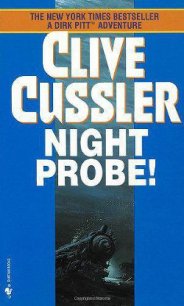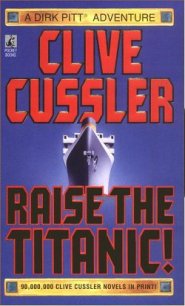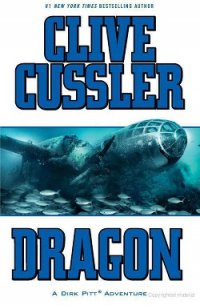Plague Ship - Cussler Clive (полные книги .TXT) 📗
“Now, this was the very beginning of the Copper Age, so it must have been a prosperous area to have enough of the metal to cover the hull of a ship that size. They brought livestock, like cattle, pigs, sheep, and goats, as well as chickens, and enough silage to last them a month.”
“I’d estimate the boat was at least three hundred feet long, for all of that.”
“The computer agrees. It came up with three hundred and eighteen feet, with a beam of forty-three feet.
She probably would have had three decks, with the animals on the bottom, supplies in the middle, and the villagers on top.”
“What about propulsion?”
“Sails.”
Cabrillo held up a hand. “Sails didn’t appear until two thousand years after the period we’re talking about.”
Eric scrolled down on the laptop sitting in front of him on the conference-room table. “Here’s a direct translation: ‘From two stout poles anchored to the deck a sheet of animal skins was stretched to catch the wind.’ ” He looked up. “Sounds like a sail to me.”
“I’ll be damned. Keep going.”
“The water eventually rose high enough to float the boat, and they started off. It’s kind of ironic, because they must have started their journey not long before the water level stabilized. Otherwise, they never would have made it out of the Black Sea. Anyway, they stayed at sea much longer than a month. In the places where they tried to land, they either couldn’t find freshwater or they were attacked by people already living there.
“After five lunar months, countless storms, and the loss of twenty people, the boat finally grounded, and no amount of work could get it free.”
“Where?”
“The area is described as ‘a world of rock and ice.’ ” Julia leaned forward to catch Juan’s eye. “This is where Eric and I started using some deductive reasoning.”
“Okay. Where?”
“Northern Norway.”
“Why Norway?”
Eric replied, “You found the tablets in a facility that Imperial Japan’s Unit 731 used to perfect biological weapons. The Japanese were very keen on this kind of research, unlike a certain ally that preferred chemical agents to do their mass killings.”
“You mean the Nazis?”
“Who else would have given the tablets to them?”
Juan rubbed his eyes. “Hold it. I’m missing something here. Why would Unit 731 want some old writings about an ancient boat?”
“The disease,” Julia said. “The one that broke out on the boat after they landed. The scribe who wrote the tablets described it in detail. As best I can tell, it was an airborne hemorrhagic fever with a contagion level equal to influenza. It killed half their population before burning itself out. What’s really interesting is, only a small handful of the survivors could bear children after they recovered. A few managed to breed with the indigenous people living nearby, bear but the virus had made most of them sterile.”
“If the Japanese were looking for a way to pacify mainland China,” Eric said, “they would definitely be interested in a disease like this. Julia and I think that, aside from the tablets, the Germans also gave them any mummified bodies they found when they discovered the boat.”
“Ah. I get it now. If the Japanese got the tablets from the Germans, you’re guessing they found them in Norway, because Germany occupied Norway, starting in 1940.”
“Right. A land of rock and ice could describe Iceland, or parts of Greenland, but the Germans never took those countries. Finland fell to the Russians, and Sweden remained neutral throughout the war. We guessed Norway, most likely a fjord on the northern coast, which is sparsely populated and largely unexplored.”
“Wait. Julia, out on deck you said Jannike was immune to this disease?”
“The more I thought about it, the more I couldn’t come up with a definitive answer for why she wasn’t affected when everyone else on the Golden Dawn had died. The disease mentioned on the tablets is airborne, and if it is the basis of whatever new virus the Responsivists have developed then she still would have breathed some contaminated air even if she was on supplemental oxygen.
“However, if an ancestor of hers had been exposed to the virus and survived, there’s a good chance she has the antibodies coded into her DNA. The fact that she comes from a small town in northern Norway only bolsters our hypothesis.”
“Can you test for it?” Juan asked.
“Sure, if I had a sample of the virus.”
Cabrillo tried to stifle a yawn. “Sorry. I need sleep. I think we’re still missing another piece of the puzzle.
Let’s assume that the Germans discovered the boat and translated the tablets. They learn about this horrible disease, and it’s something they aren’t interested in, but their Japanese allies are, so the Germans ship it to Japan, or, more precisely, to an island in the Philippines, where Unit 731 is conducting its experiments. We don’t know if they managed to perfect it, but we can assume they didn’t, since a disease like this has never been mentioned in the history books.” Julia and Eric nodded.
“How do we make the jump to the Responsivists getting their hands on it? If the Japanese failed sixty years ago, how did Severance and his gang succeed?”
“We thought about that,” Eric admitted, “but couldn’t come up with any sort of link, other than the fact that their founder, Lydell Cooper, was a leading disease researcher. They used the same facility that the Japanese had used during the war, so it’s obvious they knew about their work on the virus. We just don’t know how.”
“The next question is, why?” Juan said. “They used the virus or a derivative to kill everyone aboard the Golden Dawn. What do they plan to do with it now?” He overrode whatever answer Eric was going to give and added, “I know they see overpopulation as the worst crisis facing the planet, but unleashing a virus that kills off humanity, or even a majority of it, would leave the world in such a state of chaos that civilization would never recover. This thing is a doomsday weapon.”
“What if they don’t care?” Eric said. “What I mean is, what if they want civilization to collapse? I’ve read up on these people. They’re not rational. Nowhere in their literature do they espouse going back to the Dark Ages, but it could be that that’s exactly what they want—the end of industrialization and the return to humanity’s agrarian roots.”
“Why attack cruise ships?” Juan asked. “Why not just release the virus in every major city in the world and be done with it?”
Eric made to reply and then closed his mouth. He had no answer.
Juan pressed himself up from the table. “Listen, guys. I really appreciate all the work you’ve done, and I know this will help figure out the Responsivists’ end gambit, but if I don’t hit the rack I am going to fall asleep right here. Have you briefed Eddie about all of this?”
“Sure have,” Julia said.
“Okay, ask him to call Overholt and tell him the entire story. At this point, I don’t know what he can do, but I want the CIA in the loop. Are Mark and Linda scheduled to report in anytime soon?” Eric said, “They didn’t bring a satellite phone, so they have to use the Golden Sky’s ship-to-shore telephone. Linda said they would check in again”—he looked at his watch—“in another three hours.”
“You tell Linda that I want the two of them off that ship even if they have to steal a lifeboat or jump off the damned rail.”
“Yes, sir.”
IT SEEMED THAT JUAN had just put his head on his pillow when the phone rang.
“Cabrillo.” His tongue was cemented to his mouth, and the weak twilight streaming through the curtains was like the glare of an arc lamp.
“Chairman, it’s Hali. I think you had better come down to the Op Center to see this.”
“What is it?” He swung his legs off the bed, cradling the phone to his ear with his neck and shoulder so he could reach for his prosthesis.




